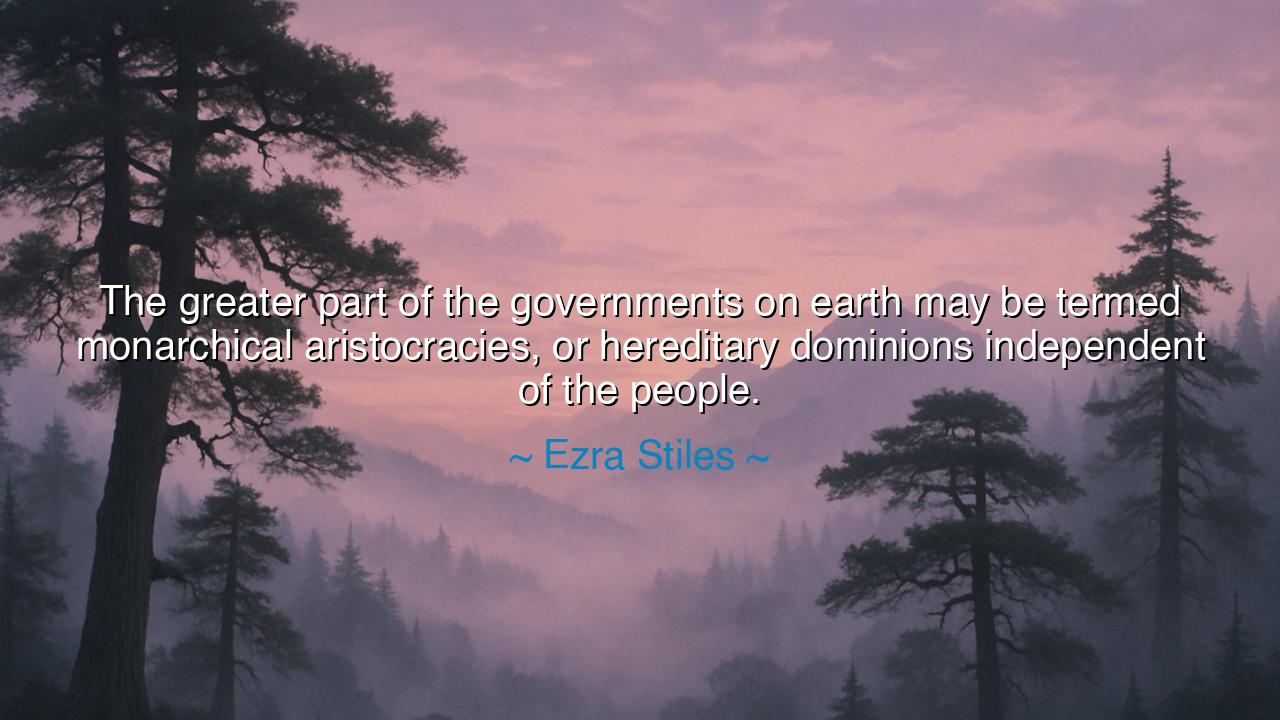
The greater part of the governments on earth may be termed
The greater part of the governments on earth may be termed monarchical aristocracies, or hereditary dominions independent of the people.






In the final years of the eighteenth century, when the young flame of liberty burned newly upon the earth, Ezra Stiles, a scholar, theologian, and one of the architects of early American thought, spoke with clarity about the nature of power and rule. He declared: “The greater part of the governments on earth may be termed monarchical aristocracies, or hereditary dominions independent of the people.” These words, though uttered in an age of powdered wigs and quill pens, ring still with prophetic resonance. For Stiles, observing the nations of his time, saw clearly that the world was governed not by justice or consent, but by inheritance and privilege — by rulers who claimed their crowns not through the will of the governed, but through the accident of birth.
The origin of this quote lies in Stiles’s reflections on the state of the world in the wake of the American Revolution. As the president of Yale College and one of the intellectual defenders of republican government, he sought to remind his countrymen that their experiment in democracy was a rare and fragile light amid the darkness of despotic rule. In 1783, when these words were spoken, the earth was still covered with kingdoms, empires, and dynasties, where monarchs sat upon thrones as though ordained by heaven, and the voices of the people were as whispers in a storm. To call these governments “hereditary dominions independent of the people” was to expose their very heart — they were systems that claimed divine legitimacy while silencing the divine spark within every human being: the right to think, to choose, to rule himself.
Stiles’s meaning was not merely descriptive; it was moral and urgent. He saw that when power is inherited, it ceases to be accountable. The king rules not because the people love him, but because they are born beneath his scepter. The nobles govern not because they serve the public good, but because their ancestors carved out dominion by the sword. In such a system, government becomes a machine of privilege, grinding down the masses while protecting the few. The people become subjects, not citizens; dependents, not participants. And in this imbalance, Stiles discerned the tragedy of history — that most men live not under laws of their own making, but under chains fashioned long before their birth.
To understand his warning, one need only look to the France of his era, where a single monarch held the fate of millions in his careless hand. Before the French Revolution, the peasants labored while the aristocracy feasted; the taxes fell upon the poor, while the rich were sheltered by their titles. The government was indeed, as Stiles described, an aristocracy of birth, indifferent to the cries of the people. When at last the storm broke — when the oppressed rose up against their masters — it was not reason that prevailed, but rage. The Bastille fell, and with it, the illusion that inherited power could endure forever. Stiles’s insight was vindicated: no dominion that denies the people’s voice can stand without violence, for justice silenced will always rise as fury.
Yet even as he condemned the monarchies of the Old World, Stiles offered a vision of hope in the New. He believed that the American Republic, if governed wisely, could prove that men are capable of ruling themselves. But his tone was not one of pride — it was one of caution. He knew that every government, even one born of liberty, carries within it the seeds of corruption. If the people grew indifferent, if power concentrated in the hands of a few, if office became a matter of inheritance or privilege, then America too would fall into the same pattern as the monarchies of Europe. The disease of aristocracy is not limited to kings; it grows wherever the spirit of vigilance dies.
In this, Stiles’s words transcend his time and speak directly to ours. For though the crowns and scepters of old may have faded, new forms of dominion have risen in their place — corporate empires, political dynasties, and bureaucratic elites who rule not by birthright, but by control of wealth and influence. The danger remains the same: power becoming independent of the people, authority detached from accountability, leadership divorced from service. In every age, the struggle between liberty and hierarchy renews itself, and the question Stiles raised — whether the people shall govern or be governed — remains the measure of every nation’s soul.
The lesson, then, is clear and eternal. Freedom is not the natural state of mankind; it is an achievement, fragile as glass and sacred as fire. It demands constant vigilance, constant participation, and a refusal to bow before any power that claims supremacy over conscience or consent. The people must remember that governments exist by their permission, not by divine right; that sovereignty belongs not to the throne, but to the human spirit. Every citizen must act as a guardian of that truth — through thought, through vote, through courage — for when the people cease to care, the old order returns in new disguise.
So let the words of Ezra Stiles be carried across generations as both warning and inspiration: “The greater part of the governments on earth may be termed monarchical aristocracies, or hereditary dominions independent of the people.” Beware any system that places power above principle, inheritance above merit, or authority above humanity. For liberty is not the gift of kings — it is the birthright of every soul. And it will endure only so long as men remember that no government, however grand, is greater than the people who give it life.






AAdministratorAdministrator
Welcome, honored guests. Please leave a comment, we will respond soon